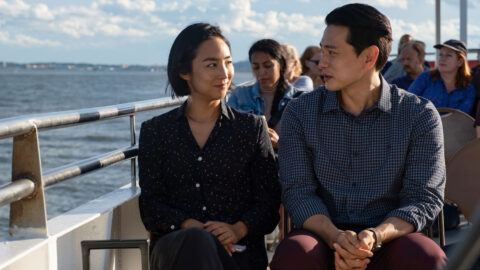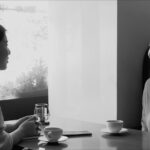Sometimes the Sundance hype is real.
I had a feeling that Past Lives (Celine Song, 2023) would be good. But I’m always a little sceptical of enthused Stateside coverage, especially after Passages (Ira Sachs, 2023). The good news is that this philosophical transcontinental romance, is one of the best films of the year so far. I’ve got to hand it to the Sundance guys on this one.
The concept is deceptively simple. Hae Sung (Teo Yoo, remarkably different from his Viktor Tsoi performance in Leto (Kirill Serebrennikov, 2018)) and Nora (Greta Lee) are two kids growing up in Seoul. Living nearby from one another, they always walk up the hill together. But Nora is leaving to go to Canada with her family, who seek new horizons beyond Korea. As the aspiring writer says, “No one from Korea wins a Nobel Prize for Literature.” But their lives continue to intersect over the years, even as they get involved with other people; all culminating in a gorgeous reconciliation that simply nails its overall philosophical tone.
Past Lives refers to the Buddhist-inspired Korean concept of inyun, which is essentially untranslatable, but speaks to the idea that people who meet a lot of times in the past have built up a large reserve. For example, a couple who are married in their current life, may have come into contact with each other thousands of times before, but never culminated their mutual feelings. Exploring this what if idea of while also commenting on the dislocation of the immigrant experience, Past Lives is filled with great ruminations on the true meaning of identity and belonging.
She feels like a changed person when she speaks Korean and when she speaks English. Some people believe that when you speak another language you lose your personality. I don’t think that’s entirely true. But you are different, as language itself is loaded with a shared cultural understanding. Lee’s dual performance is remarkable. Equally refreshing is John Magaro perfectly cast as her supportive husband. In a little bit of metafictional ribbing, he mentions that in a classic drama, he would be the stereotypical jealous and possessive white husband, banning her from meeting with Hae Sung. Instead, his magnanimity deepens the concept considerably.
It looks astounding. Celine Song, in her first film, really thinks about where to put the camera and how good blocking and cinematography can elevate an entire scene. One New York shot in particular, is astonishing in both its mise-en-scéne and its generosity, showing the characters enveloped by the city and a crucial part of its larger tapestry; following them as they walk along the Hudson and talk about their current paths in life. This warrants the Before comparisons I saw coming out of Park City. But while Linklater’s trilogy featured constrained time frames, the epic scope of Past Lives brings us back to the Golden Age of cinema, recalling classics like An Affair to Remember (Leo McCarey, 1957) or Letter from an Unknown Woman (Max Ophüls, 1948).
A miracle like Past Lives is harder than it looks. Push the sentiment just a little too much and it becomes a treacly mess. Instead, the tone feels close-to-perfect, presenting a fresh romantic comedy-of-ideas for a time sorely missing in them. I’m picturing Song in thousands of previous lives, making a slightly better film each and every time. This feels like one of her later ones.

Redmond is the editor-in-chief of Journey Into Cinema.




